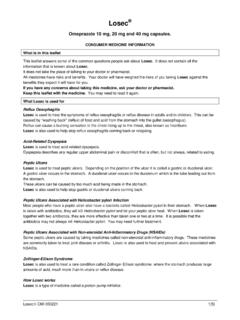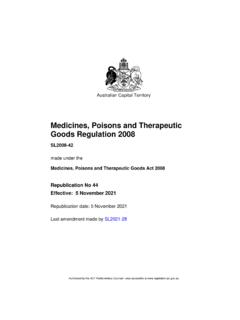Transcription of Opioid Medicines – Part B: Opioid Patient Information Handout
1 Information for Patients and FamiliesOpioid MedicinesSIGNS OF OVERDOSECall 911 or your local emergency response provider right away if you suspect an Opioid overdose or think you may have taken too much. * Hallucinations Confusion Difficulty walking Extreme drowsiness/dizziness Slow or unusual breathing Unable to be woken up Cold and clammy skinThis Handout is a summary and will not tell you everything about Opioid Medicines . More Information about the Opioid you have been prescribed (or naloxone) can be found online in the Product Monograph: WARNINGS Opioid overdose can lead to death. Overdose is more likely to happen athigher doses, or if you take opioids with alcohol or with other sedating drugs(such as sleeping pills, anxiety medication, anti-depressants, muscle relaxants).
2 Addictionmay occur, even when opioids are used as prescribed. Physical dependence can occur when opioids are used every day. This canmake it hard to stop using them. Life-threatening breathing problems or reduced blood pressuremay occur with Opioid use. Talk to the health professional who prescribed youropioid about whether any health conditions you have may increase your risk. Your pain may worsen with long-term Opioid use or at higher may not feel pain relief with further increases in your dose. Talk to thehealth professional who prescribed your Opioid if this happens to you, as alower dose or a change in treatment may be required. Withdrawal symptoms, such as widespread pain, irritability, agitation,flu-like symptoms and trouble sleeping, are common when you stop or reducethe use of opioids.
3 Babies born to mothers taking opioids may develop life-threateningwithdrawal symptoms. Use only as directed. Crushing, cutting, breaking, chewing or dissolvingopioids before consuming them can cause serious harm, including have been prescribed an Opioid medicine for the treatment of pain or for another to the health professional who prescribed your Opioid , or your pharmacist if you: YOUR OPIOIDS MAY BE FATAL TO OTHERS Never give your Opioid medicine to anyone. Store opioids (including used patches) in a secure place to prevent theft, problematic use or accidental exposure. Keep opioids out of sight and reach of children and pets. Taking even one dose by accident can be fatal. Never throw opioids (including used patches) into household trash where children and pets may find them.
4 Return expired, unused or used opioids (including patches) to a pharmacy for proper disposal . Reduced physical and/or mental abilities, depression Drowsiness, dizziness, risks of falls/fractures Heart palpitations, irregular heartbeatPOSSIBLE SIDE EFFECTS Vision problems, headache Low sex drive, erectile dysfunction, infertility Severe constipation, nausea, vomiting Problems sleeping, may cause or worsen sleep apnea Have questions about your Opioid medicine . Do not understand the instructions for using the Opioid medicine given to you. Develop side effects or your condition worsens.* Naloxone has been approved byHealth Canada to temporarily reverse known or suspected Opioid : 2019/03/15















